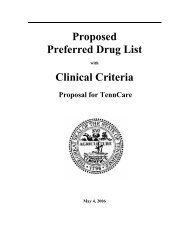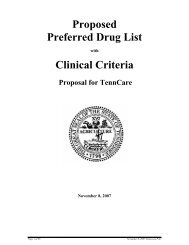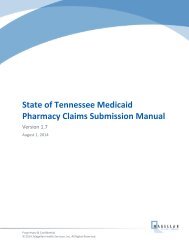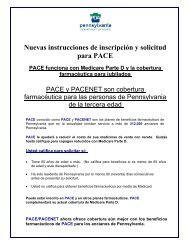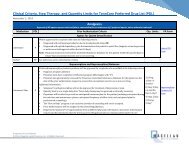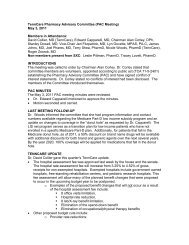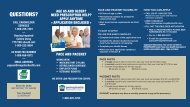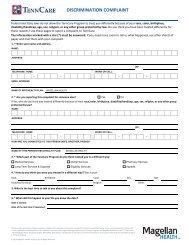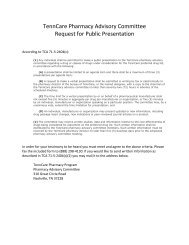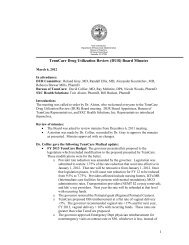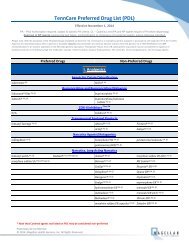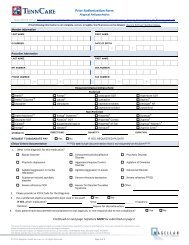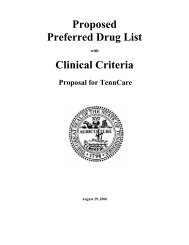Drug: ACCUTANE - Magellan Health Services || TennCare Portal
Drug: ACCUTANE - Magellan Health Services || TennCare Portal
Drug: ACCUTANE - Magellan Health Services || TennCare Portal
You also want an ePaper? Increase the reach of your titles
YUMPU automatically turns print PDFs into web optimized ePapers that Google loves.
BACKGROUND<br />
ENDOCRINE & METABOLIC AGENTS<br />
NEW: SODIUM-GLUCOSE CO-TRANSPORTER-2 (SGLT2) INHIBITOR<br />
<br />
<br />
<br />
<br />
Canagliflozin (Invokana) is a sodium-glucose co-transporter 2 (SGLT2) inhibitor. SGLT2<br />
is the transporter responsible for reabsorbing the majority of glucose filtered by the<br />
tubular lumen in the kidney. SGLT2 is expressed in the proximal renal tubules. By<br />
inhibiting SGLT2, canagliflozin reduces reabsorption of filtered glucose and lowers the<br />
renal threshold for glucose (RTG), and thereby increases urinary glucose excretion,<br />
improving blood glucose control.<br />
Canagliflozin is FDA-approved as as an adjunct to diet and exercise to improve glycemic<br />
control in adults with type 2 diabetes mellitus. Canagliflozin is not indicated for type 1<br />
diabetes or diabetic ketoacidosis.<br />
The most common adverse effects seen in clinical trials were genital mycotic infections,<br />
urinary tract infections, increased urination, vulvovaginal pruritis, thirst, constipation,<br />
nausea and abdominal pain. Other adverse effects include: asthenia, fatigue, acute or<br />
chronic pancreatitis, bone fracture, hypersensitivity reactions, photosensitivity, and<br />
volume depletion.<br />
o Canagliflozin is contraindicated in patients with severe renal impairment<br />
[estimated glomerular filtration rate (eGFR) less than 30 mL/min/1.73 m 2 ], end<br />
stage renal disease (ESRD), and in patients on dialysis.<br />
o Precautions:<br />
• Symptomatic hypotension can occur after starting canagliflozin as it<br />
causes intravascular volume contraction. Symptomatic hypotension<br />
occurs particularly in patients with impaired renal function (eGFR less<br />
than 60 mL/min/1.73 m 2 ), elderly patients, patients with low systolic blood<br />
pressure, and patients on diuretics or drugs which interfere with the<br />
renin-angiotensin-aldosterone system.<br />
• Canagliflozin can cause hyperkalemia. Patients with moderate renal<br />
impairment who are also taking medications that interfere with potassium<br />
excretion or the renin-angiotensin-aldosterone system are more<br />
susceptible to the development of hyperkalemia.<br />
• Canagliflozin may cause dose-related increases in low-densitylipoprotein<br />
cholesterol (LDL-C).<br />
• Canagliflozin is Pregnancy Category C.<br />
o <strong>Drug</strong>-<strong>Drug</strong> Interactions:<br />
• When administered with UDP-Glucuronosyl Transferase (UGT) enzyme<br />
inducers (e.g. rifampin, phenytoin, ritonavir, phenobarbital) the exposure<br />
of canagliflozin is reduced which may decrease the efficacy of<br />
canagliflozin.<br />
• Co-administration of digoxin and canagliflozin may increase the<br />
exposure to digoxin.<br />
Clinical Trials<br />
o<br />
A 26 week, double-blind, placebo- and active-controlled study was performed in<br />
1,284 patients with type 2 diabetes who were inadequately controlled on<br />
metformin monotherapy (greater than or equal to 2,000 mg/day, or at least 1,500<br />
mg/day if higher dose not tolerated) to assess the safety and efficacy of<br />
canagliflozin when combined with metformin. If patients were taking less than<br />
the required metformin dose or were taking metformin plus another<br />
antihyperglycemic (n=275) they were switched to metformin monotherapy for at<br />
least eight weeks before they were allowed to enter the two week, single-blind,<br />
placebo run-in. Patients who were already taking the required metformin dose<br />
(n=1,009) were immediately allowed to enter a two-week, single-blind, placebo<br />
run-in period. After completing the placebo run-in phase, patients were<br />
randomized to receive canagliflozin 100 mg, canagliflozin 300 mg, sitagliptin 100<br />
mg, or placebo once daily with metformin. The study indicated that canagliflozin<br />
100 mg and canagliflozin 300 mg once daily with metformin resulted in<br />
statistically significant improvements in HbA 1 C compared to placebo with<br />
Page 4 of 14<br />
August 13, 2013 Tennessee PAC



